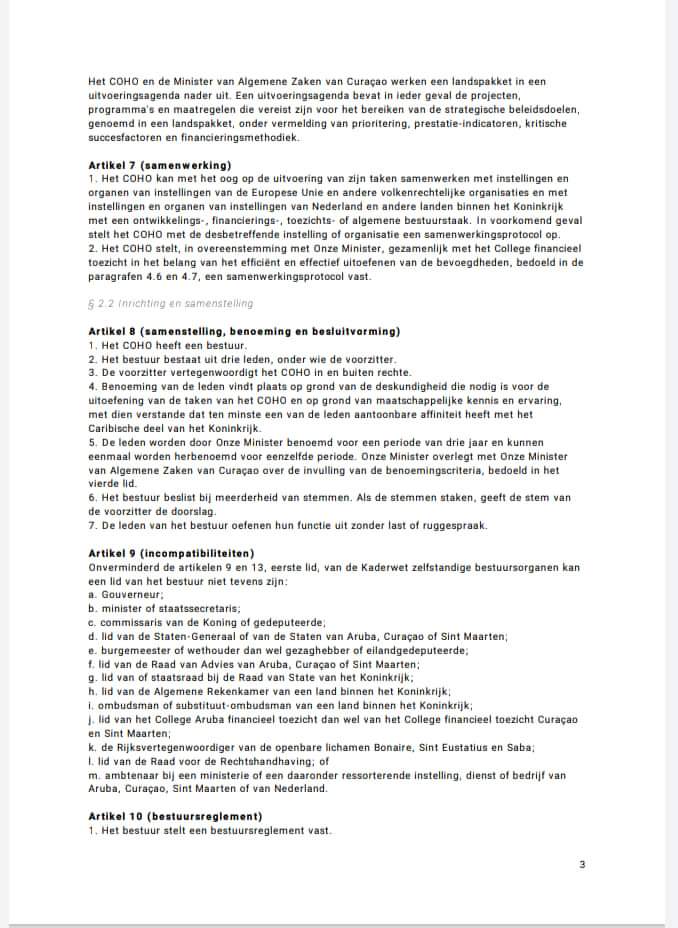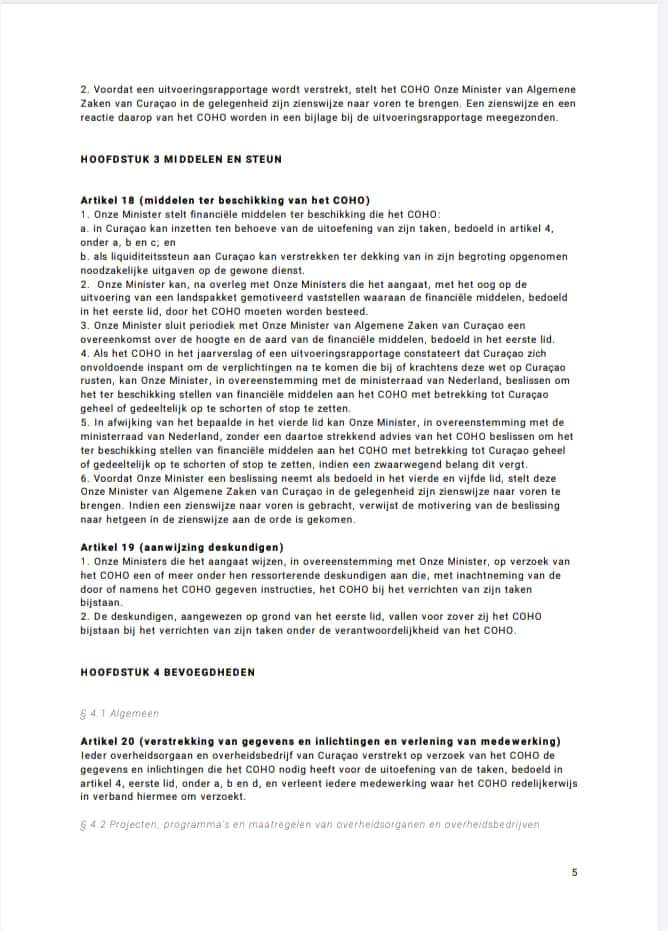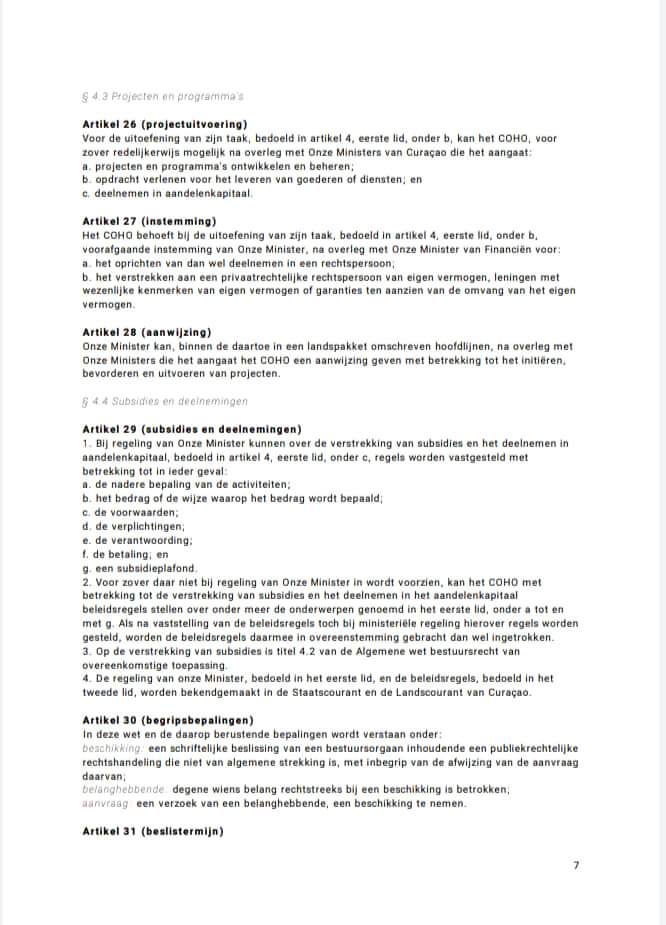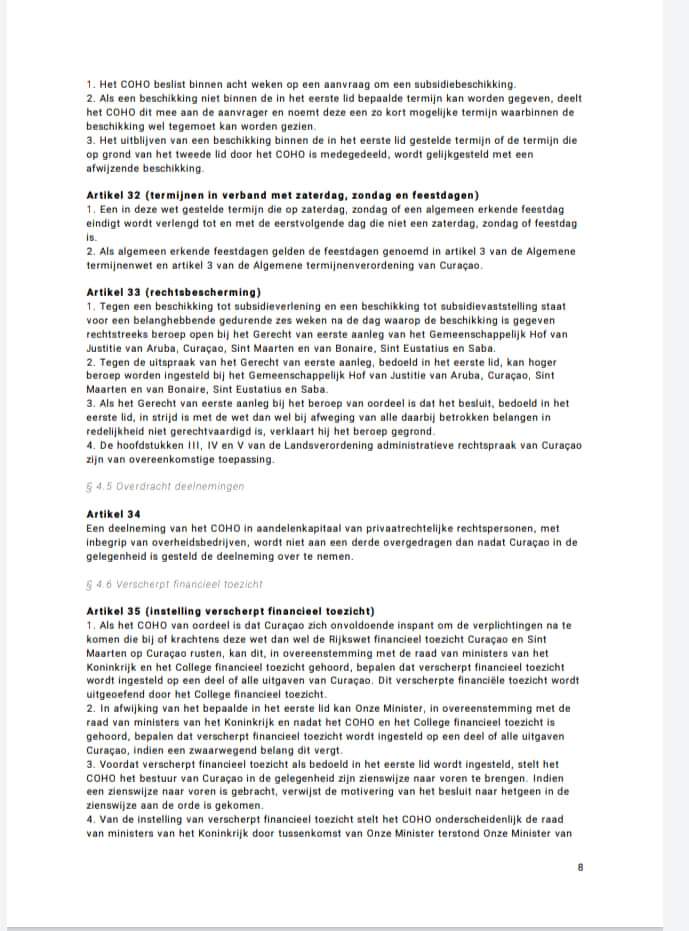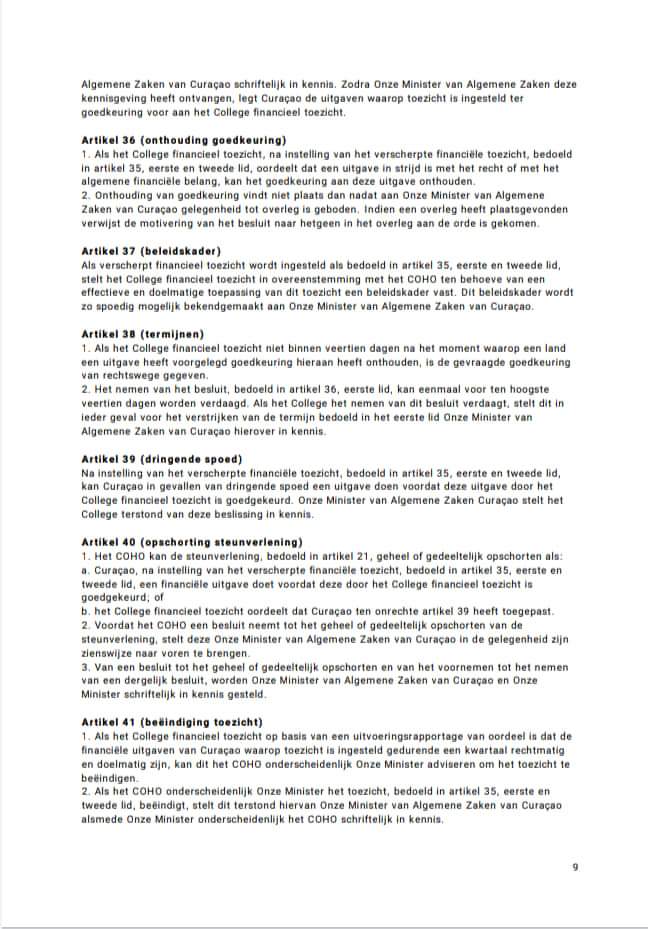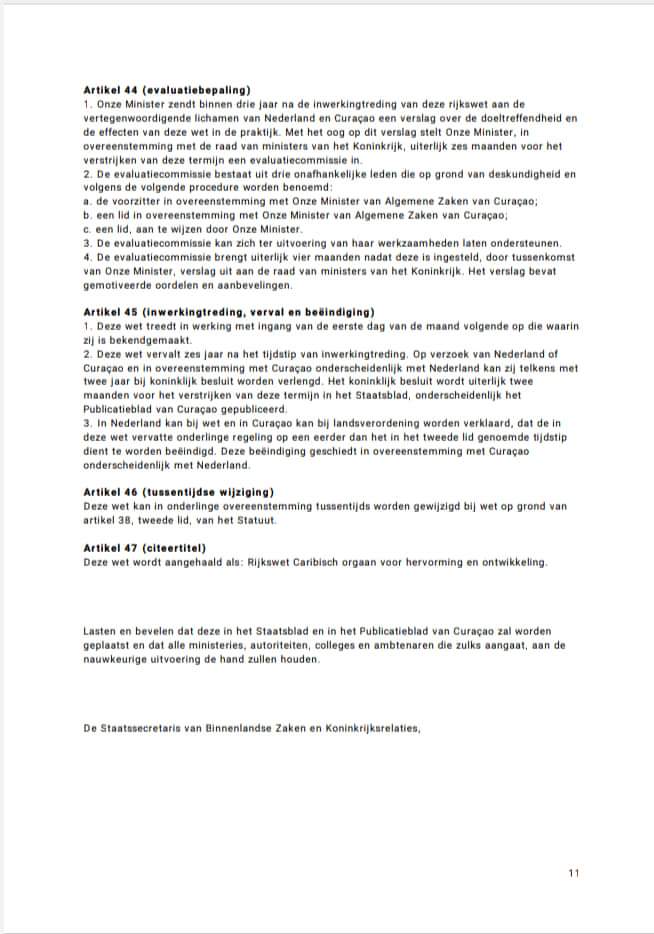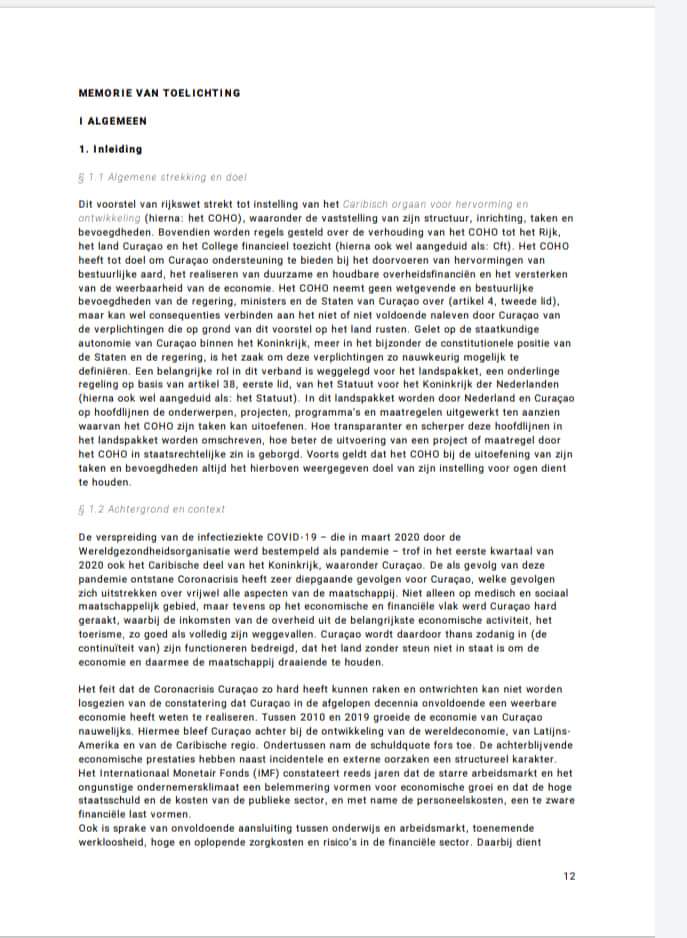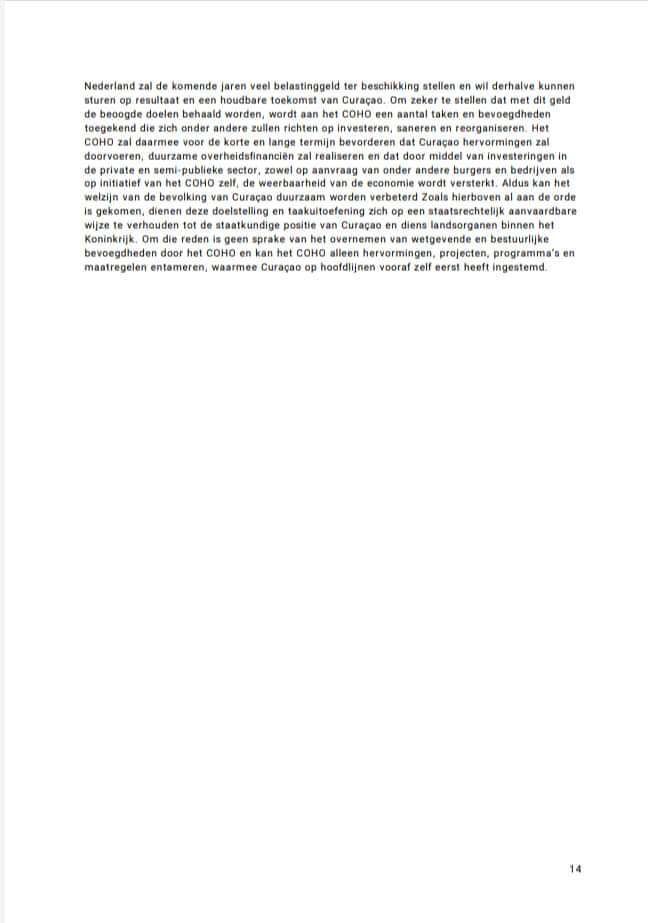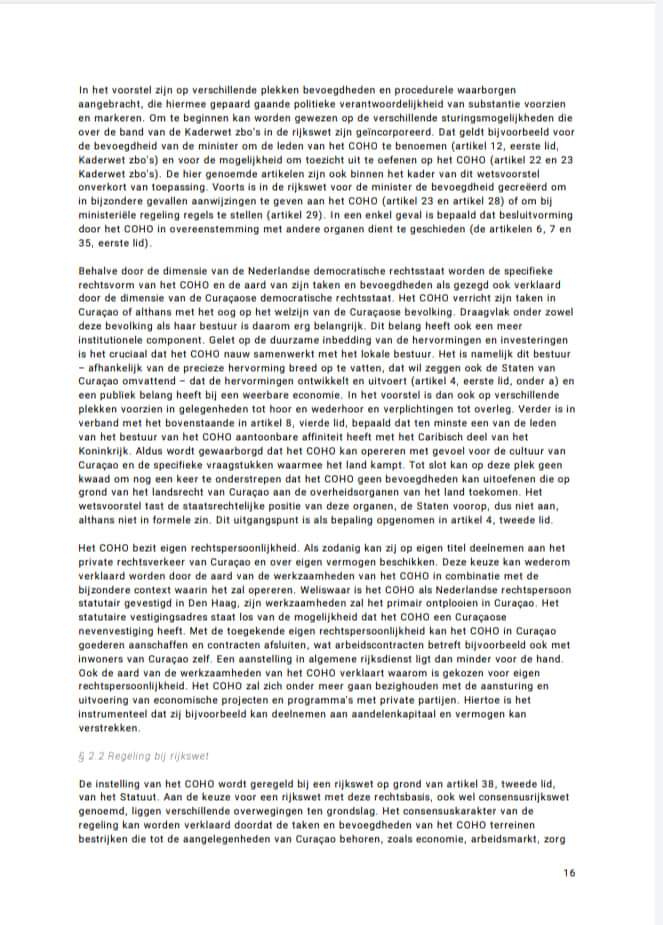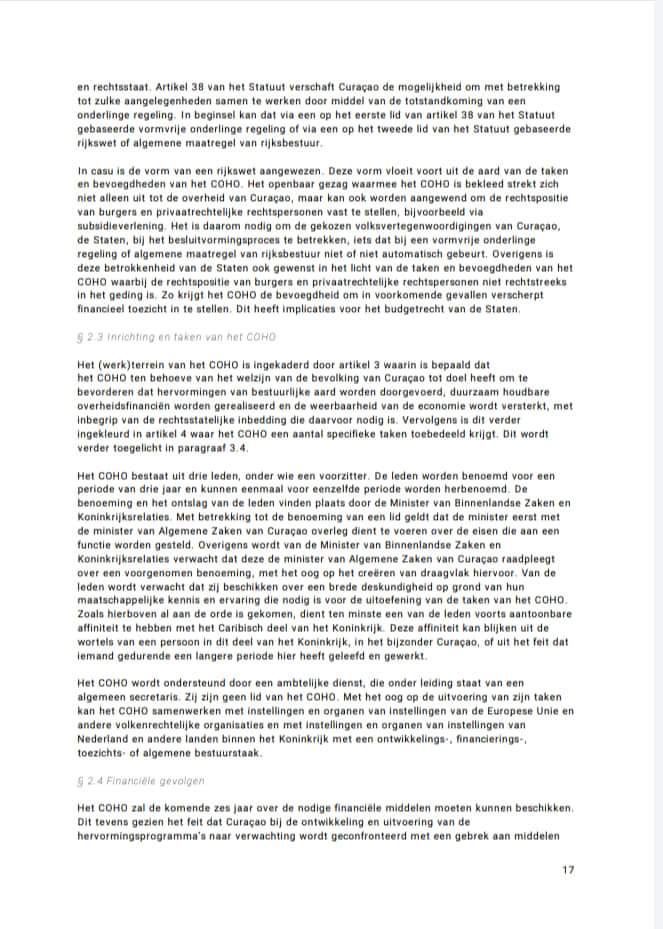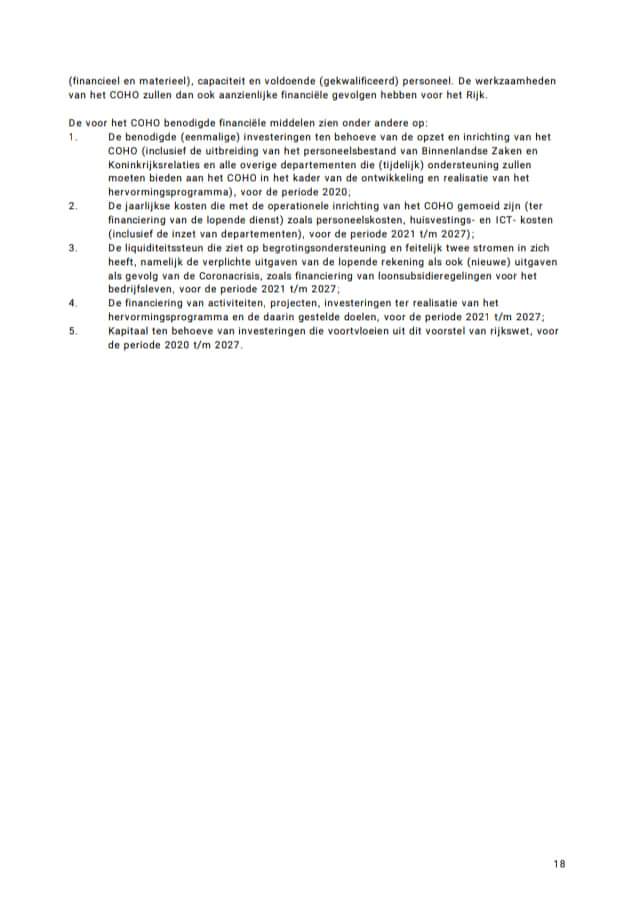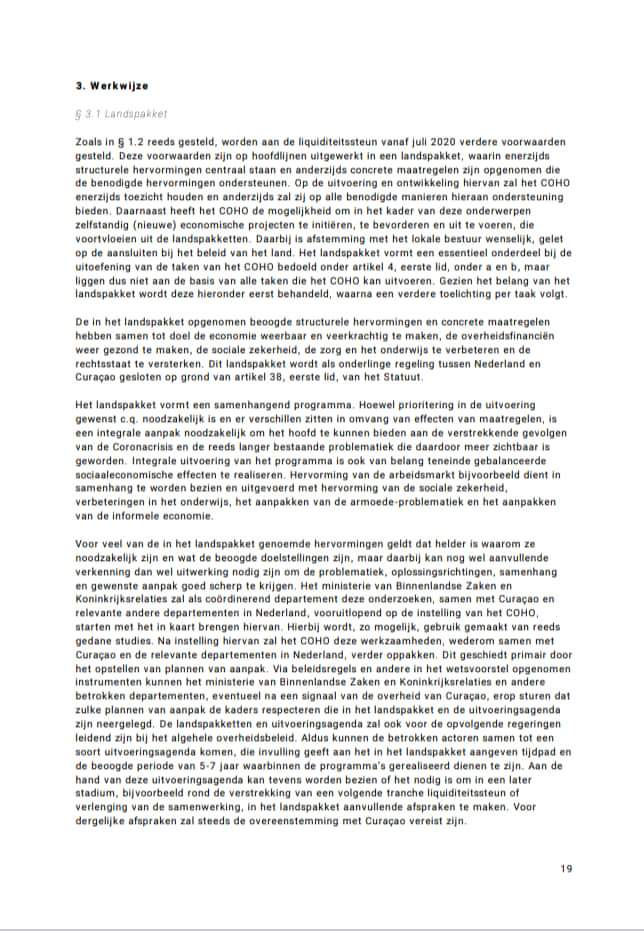
COHO PROPOSAL -ALL 51 PDF DOCUMENTS Translated To English: Proposal Of Kingdom Act On The Caribbean Body For Reform And Development COHO. Articles And EM Posted by Sint Maarten News Kingdom Act of [date], containing rules regarding the establishment of the Caribbean body for reform and development (Kingdom Act Caribbean body for reform and development) We Willem-Alexander, by the grace of God, King of the Netherlands, Prince of Orange-Nassau, etc. etc. etc. All who will see or hear it read, salute! do to know: Thus We have taken into consideration that the governments of the Netherlands and Curaçao consider it desirable, with a view to the well-being of the population of Curaçao, to cooperate in implementing reforms of an administrative nature, realizing sustainable and sustainable public finances and strengthening of the resilience of the economy in Curaçao; that in connection with absorbing the economic contraction as a result of the COVID-19 crisis, it is desirable that the Netherlands make temporary liquidity support available to Curaçao; that the governments of the Netherlands and Curaçao have agreed for this purpose that in a law under Article 38, second paragraph, of the Charter for the Kingdom of the Netherlands a an administrative body with independent tasks and powers is established to provide support in this regard; Thus it is that We, having heard the Advisory Division of the Council of State of the Kingdom, and in consultation with the States General, have approved and understood the provisions of the Statute for the Kingdom, as We approve. and mean by this: CHAPTER 1 GENERAL PROVISIONS Article 1 (definitions) In this Act and the provisions based thereon, unless determined otherwise, the following terms have the following meanings: board: the board of the Caribbean body for reform and development, as referred to in Article 8; COHO: the Caribbean body for reform and development referred to in Article 2; Board of financial supervision Curaçao and Sint Maarten: the Board of financial supervision, referred to in Article 2, first paragraph, of the Financial Supervision Act Curaçao and Sint Maarten; country package: a country package as referred to in Article 5, paragraph 1; Our Minister: Our Minister of the Interior and Kingdom Relations; government body: an administrative body or other body that is vested with public authority by or pursuant to the Constitution of Curaçao or mutual regulation within the meaning of Article 38 of the Statute; public company: an enterprise with legal personality under private law, not being a partnership with legal personality, in which a legal person under public law, whether or not together with one or more other legal persons under public law, is able to determine the policy, within the meaning of Article 25g, second paragraph, of the Competition Act, or an enterprise in the form of a partnership, in which a legal entity under public law participates; action plan: an action plan as referred to in Article 22; projects, programs and measures: the projects, programs and measures referred to in Article 4, first paragraph, under a and b; Statute: Statute for the Kingdom of the Netherlands. CHAPTER 2 THE CARIBBEAN REFORM AND DEVELOPMENT BODY § 2.1 Institution and tasks Article 2 (Caribbean Body for Reform and Development) 1. There is a Caribbean Body for Reform and Development. 2. The COHO is located in The Hague. 3. The COHO has legal personality under Dutch law. 4. Articles 8-16; 18-35; and 41 of the Independent Administrative Bodies Framework Act apply mutatis mutandis to the COHO. Article 3 (purpose) For the benefit of the well-being of the population of Curaçao, the COHO aims to promote in Curaçao that reforms of an administrative nature are implemented, sustainably sustainable public finances are realized and the resilience of the economy is strengthened, including the embedding of the rule of law for this. is needed. Article 4 (tasks) 1. Within the framework of the objective referred to in Article 3, the COHO has the following task: a. the support and supervision of the development and implementation of projects, programs and measures by government bodies and public companies of Curaçao with regard to the subjects described in a national package; b. initiating, promoting and implementing projects and programs related to the topics defined in a country package; c. the provision in Curaçao of subsidies to citizens and private legal persons, including public companies, on request, or participating in the share capital in private law legal persons, including public companies; d. establishing stricter financial supervision, if appropriate, in Curaçao. 2. In the performance of the tasks referred to in the first paragraph, the COHO cannot exercise any powers that are vested in a government body on the basis of the land law of Curaçao. Article 5 (land parcels) 1. A country spakket is a coherent package of reforms and investments aimed at achieving the objective referred to in Article 3, and in any case relates to the following subjects: a.the government; b. the finances c. economic reforms; d. the care; e. social security; f. the education; g. strengthening the rule of law; and h. the infrastructure. 2.the subjects, as referred to in the first paragraph, and the projects, programs and measures, as referred to in Article 4, first paragraph, under a and b, are elaborated in outline in a national package, stating the strategic policy objectives to be achieved with them. . 3. A country package is concluded as a mutual arrangement between the Netherlands and Curaçao on the basis of Article 38, first paragraph, of the Charter. 4. By or pursuant to a country package it may be stipulated that the development and implementation of projects, programs and measures will take place without the support and supervision of the COHO. Article 6 (implementation agenda) The COHO and the Minister of General Affairs of Curaçao are further elaborating a country package in an implementation agenda. An implementation agenda contains in any case the projects, programs and measures that are required to achieve the strategic policy goals, stated in a country package, stating priorities, performance indicators, critical success factors and financing methodology. Article 7 (cooperation) 1. In order to carry out its tasks, the COHO may cooperate with institutions and bodies of institutions of the European Union and other international law organizations and with institutions and bodies of institutions of the Netherlands and other countries within the Kingdom with a development, financing , supervisory or general management task. Where appropriate, the COHO will draw up a collaboration protocol with the relevant institution or organization. 2. In agreement with Our Minister, the COHO will establish a cooperation protocol together with the Financial Supervision Council in the interest of the efficient and effective exercise of the powers referred to in sections 4.6 and 4.7. § 2.2 Design and composition Article 8 (composition, appointment and decision-making) 1. The COHO has a board. 2. The board consists of three members, including the chairman. 3. The chairman represents the COHO in and out of court. 4. Appointment of the members takes place on the basis of the expertise required for the performance of the tasks of the COHO and on the basis of social knowledge and experience, on the understanding that at least one of the members has demonstrable affinity with the Caribbean. part of the kingdom. 5. The members are appointed by Our Minister for a period of three years and can be reappointed once for the same period. Our Minister consults with Our Minister of General Affairs of Curaçao about the interpretation of the appointment criteria referred to in the fourth paragraph. 6. The board decides by a majority of votes. If the votes are tied, the vote of the chairman is decisive. 7. The members of the board perform their duties without instructions or consultation. Article 9 (incompatibilities) Without prejudice to Articles 9 and 13, paragraph 1, of the Autonomous Administrative Bodies Framework Act, a member of the board cannot also be: a. Governor; b. minister or state secretary; c. King’s Commissioner or Commissioner; d. member of the States General or of the States of Aruba, Curaçao or Sint Maarten; e. mayor or alderman or island governor or island commissioner; f. member of the Advisory Board of Aruba, Curaçao or Sint Maarten; g. member of or state councilor of the Council of State of the Kingdom; h. member of the General Audit Chamber of a country within the Kingdom; i. ombudsman or deputy ombudsman of a country within the Kingdom; j. member of the Aruba Financial Supervision Board or of the Curaçao and Sint Maarten Financial Supervision Board; k. the Kingdom Representative of the public entities Bonaire, Sint Eustatius and Saba; l. member of the Law Enforcement Council; or m. civil servant at a ministry or a subordinate institution, service or company of Aruba, Curaçao, Sint Maarten or the Netherlands. Article 10 (board regulations) 1. The board adopts administrative regulations. 2. The administrative regulations will be published in the Government Gazette and the Curaçao National Gazette. Article 11 (policy rules) Without prejudice to Article 21, second paragraph, of the Independent Administrative Bodies Framework Act, policy rules with regard to the performance of its duties by the COHO are published in the Curaçao Government Gazette. § 2.3 Official service Article 12 (the official service) 1. The board is supported by an official service. 2. The official service is headed by a general secretary. Article 13 (incompatibilities) 1. The algNeither a secretary nor one of the employees of the civil service is a member of the board. 2. Neither the general secretary nor any of the employees of the civil service performs ancillary positions that are undesirable with a view to the proper performance of his position or to maintain his independence or confidence in it. 3. The general secretary or the employee of the civil service shall report the intention to accept an ancillary position other than by virtue of his position to the board. § 2.4 Admission Article 14 (admission) The members of the board and the general secretary and the employees of the official service that supports the board, their spouses or registered partners and minor children, insofar as they run a common household with them, are legally admitted to Curaçao. No further conditions are imposed on the members, the general secretary and the employees of the COHO as well as their spouses or registered partners and minor children for the exercise of a profession or the performance of work. § 2.5 Financing COHO Article 15 (remuneration and other administrative expenses) The remuneration of the members of the board, the remuneration of the general secretary and the employees of the civil service, as well as the funding of other administrative expenses, are charged to the budget of Our Minister. § 2.6 Annual report and implementation report Article 16 (annual report) 1. In the application of article 18, second paragraph, of the Framework Act on independent administrative bodies, the annual report is also sent to the board and to the Parliament of Curaçao. 2. Before the annual report is sent, the COHO will give Our Minister of General Affairs of Curaçao the opportunity to express his views. A view and a response from the COHO are included in an appendix to the annual report. 3. Our Minister shall send the annual report to Our Ministers concerned. Article 17 (implementation report) 1. The COHO will provide Our Minister every six months, and if necessary in the interim at the request of Our Minister, with an implementation report on the implementation of the obligations imposed on Curaçao by or pursuant to this Act. 2. Before an implementation report is provided, the COHO will give Our Minister of General Affairs of Curaçao the opportunity to express his views. A view and a response from the COHO are included in an appendix to the implementation report. CHAPTER 3 RESOURCES AND AID Article 18 (resources available to the COHO) 1. Our Minister makes financial resources available that the COHO: can deploy in Curaçao for the performance of his duties, as referred to in Article 4, under a, b and c; and b. can provide liquidity support to Curaçao to cover necessary expenses on the regular service included in its budget. 2. Our Minister may, after consultation with Our Ministers concerned, with a view to the implementation of a national package, determine in a substantiated manner how the financial resources referred to in the first paragraph should be spent by the COHO. 3. Our Minister will periodically conclude an agreement with Our Minister of General Affairs of Curaçao about the amount and nature of the financial resources referred to in the first paragraph. 4. If the COHO establishes in the annual report or an implementation report that Curaçao is making insufficient effort to fulfill the obligations imposed on Curaçao by or pursuant to this Act, Our Minister may, in agreement with the Council of Ministers of the Netherlands, suspend or discontinue all or part of the provision of financial resources to the COHO with regard to Curaçao. 5. Contrary to the provisions of the fourth paragraph, Our Minister may, in agreement with the Council of Ministers of the Netherlands, decide to make all or part of the financial resources available to the COHO with regard to to suspend or discontinue, if a compelling interest requires this. 6. Before Our Minister takes a decision as referred to in the fourth and fifth paragraphs, he shall give Our Minister of General Affairs of Curaçao the opportunity to express his views. If an opinion has been put forward, the reasons for the decision refer to what has been discussed in the opinion. Article 19 (appointment of experts) 1. Our Ministers concerned, in agreement with Our Minister, at the request of the COHO, appoint one or more experts under their jurisdiction to the COHO, with due observance of the instructions given by or on behalf of the COHO, in the performance of its duties. assist. 2. The experts appointed on the basis of the first paragraph are covered insofar asthey assist the COHO in the performance of its duties under the responsibility of the COHO. CHAPTER 4 POWERS § 4.1 General Article 20 (provision of data and information and provision of cooperation) At the request of the COHO, every government body and public company of Curaçao shall provide the data and information that the COHO needs for the performance of the tasks referred to in Article 4, paragraph 1, under a, b and d, and will provide any cooperation that COHO reasonably requests in connection with this. § 4.2 Projects, programs and measures of government bodies and public companies Article 21 (support for projects, programs and measures) For the performance of the task referred to in Article 4, first paragraph, under a, the COHO can: a. Provide financial resources directly or indirectly; b. make expertise and implementation capacity available; and c. auditing governments and public companies. Article 22 (action plan) 1. The COHO may, with due observance of the outlines described in a national package, after consultation with the government bodies and public companies concerned by it, draw up an action plan for the development and implementation of a project, program or measure. 2. Insofar as relevant, an action plan contains at least: a description of the nature of the support referred to in Article 21; b. a description of the goals to be achieved, products to be delivered and associated action points; c. a budget and a proposal to cover the intended financial resources; d. the timeline; e. an overview of the required expertise and implementation capacity; f. an overview of required regulatory actions g. an agreement about reporting lines; h. a division of responsibilities. 3. The COHO shall immedia tely send an action plan to the government bodies and other parties concerned, as well as to Our Minister and to Our Ministers concerned. Article 23 (designation) Our Minister may, within the outlines described for this purpose in a national package, after consultation with Our Ministers concerned by the COHO, give instructions regarding an action plan for the development and implementation of a project, program or measure by government bodies. Article 24 (suspension of aid) 1. The COHO may suspend all or part of the support referred to in Article 21 if the relevant government body or public company, in the opinion of the COHO: a. Does not implement a project, program or measure on time; b. does not implement a project, program or measure in the manner agreed in the country packages or detailed in an action plan; or c. fails to provide the data and information or to cooperate as referred to in Article 20. 2. Before the COHO takes a decision to suspend all or part of the aid, it shall give the relevant government body or public company the opportunity to express its views. 3. The COHO will not implement the decision to suspend the grant in whole or in part until after a period stated in the decision has expired, within which the relevant government body or public company has been able to fulfill its obligation. 4. The relevant government body or public company and Our Minister shall be notified in writing of a decision to suspend the whole or in part and of the intention to take such a decision. If the relevant government body or public company has expressed an opinion, this will be stated in the decision. Article 25 (provision) If the decision to suspend all or part of the support referred to in Article 24 has not resulted in the relevant government body or public undertaking implementing the project or measure in the manner laid down in the national package or an action plan or the requested cooperates as yet, the COHO may advise the Council of Ministers of the Kingdom through the intervention of Our Minister to make a provision under the Charter. § 4.3 Projects and programs Article 26 (project implementation) For the performance of its task, as referred to in Article 4, first paragraph, under b, the COHO may, insofar as reasonably possible after consultation with Our Ministers of Curaçao concerned by it: a. Develop and manage projects and programs; b. to commission the supply of goods or services; and c. participate in share capital. Article 27 (consent) In the performance of its task referred to in Article 4, paragraph 1, under b, the COHO requires the prior consent of Our Minister, after consultation with Our Minister of Finance, for: a. Establishing or participating in a legal entity; b. provide itn to a legal entity under private law of equity capital, loans with substantial equity characteristics or guarantees with regard to the amount of equity capital. Article 28 (designation) Our Minister may, within the outlines described in a national package, after consultation with Our Ministers concerned, give the COHO instructions regarding the initiation, promotion and implementation of projects. § 4.4 Grants and participating interests Article 29 (grants and participations) 1. By regulation of Our Minister, rules may be laid down with regard to the provision of subsidies and the participation in share capital as referred to in Article 4, first paragraph, under c, with regard to at least: a.the details of the activities; b. the amount or the manner in which the amount is determined; c. the conditions; d. the obligations; e. the accountability; f. the payment; and g. a subsidy ceiling. 2. Insofar as not provided for by regulation of Our Minister, the COHO may lay down policy rules with regard to the provision of subsidies and participation in the share capital on, among other things, the subjects referred to in the first paragraph, under a to g . If, after adoption of the policy rules, rules are set in this regard by ministerial regulation, the policy rules will be brought into line with them or withdrawn. 3. Title 4.2 of the General Administrative Law Act applies mutatis mutandis to the granting of subsidies. 4. The regulations of our Minister, referred to in the first paragraph, and the policy rules, referred to in the second paragraph, will be published in the Government Gazette and the Curaçao National Gazette. Article 30 (definitions) In this Act and the provisions based on it, the following terms have the following meanings: decision: a written decision of an administrative body containing a legal act under public law that is not of general application, including the rejection of the application thereof; interested party: the person whose interest is directly involved in a decision; application: a request from an interested party to make a decision. Article 31 (decision period) 1. The COHO will make a decision on an application for a subsidy decision within eight weeks. 2. If a decision cannot be made within the term stipulated in the first paragraph, the COHO will inform the applicant of this and specify the shortest possible term within which the decision can be expected. 3. Failure to make a decision within the period stated in the first paragraph or the period communicated by the COHO on the basis of the second paragraph is equated with a negative decision. Article 32 (deadlines in connection with Saturdays, Sundays and public holidays) 1. A period set in this Act that ends on a Saturday, Sunday or a generally recognized public holiday will be extended up to and including the next day that is not a Saturday, Sunday or public holiday. 2. The public holidays referred to in Article 3 of the General Time Limits Act and Article 3 of the General Time Limits Ordinance of Curaçao apply as generally recognized public holidays. Article 33 (legal protection) 1. An interested party can appeal directly to the Court of First Instance of the Common Court of Justice of Aruba, Curaçao, Sint Maarten and the Court of First Instance against a decision to grant a subsidy and a decision to determine the subsidy. from Bonaire, Sint Eustatius and Saba. 2. An appeal may be lodged against the decision of the Court of First Instance referred to in the first paragraph with the Common Court of Justice of Aruba, Curaçao, Sint Maarten and Bonaire, Sint Eustatius and Saba. 3. If the Court of First Instance, in the appeal, is of the opinion that the decision referred to in subsection 1 is contrary to the law or is not reasonably justified when weighing up all the interests involved, it will declare the appeal to be well-founded. . 4. Chapters III, IV and V of the National Ordinance Administrative Jurisprudence of Curaçao apply mutatis mutandis. § 4.5 Transfer of participating interests Article 34 A participation of the COHO in the share capital of legal entities under private law, including public companies, will not be transferred to a third party until Curaçao has been given the opportunity to take over the participation. § 4.6 Enhanced financial supervision Article 35 (institution of stricter financial supervision) 1. If the COHO is of the opinion that Curaçao is making insufficient effort to comply with the obligations imposed on Curaçao by or pursuant to this Act or the Financial Supervision Act of Curaçao and Sint Maarten, this may be done, in accordance with the Council of Ministers of Curaçao. after having heard the Kingdom and the Financial Supervision Council, determine that stricter financial supervision be institutedon some or all of Curaçao’s expenses This stricter financial supervision is exercised by the Financial Supervision Council. 2. Contrary to the provisions of subsection 1, Our Minister may, in agreement with the Council of Ministers of the Kingdom and after the COHO and the Financial Supervision Council have been consulted, determine that stricter financial supervision will be instituted for some or all of the expenditure. Curaçao, if required by a compelling interest. 3. Before stricter financial supervision as referred to in the first paragraph is instituted, the COHO will give the board of Curaçao the opportunity to express its views. If an opinion has been put forward, the reasons for the decision refer to what has been discussed in the opinion. 4. The COHO shall immediately notify Our Minister of General Affairs of Curaçao in writing of the institution of stricter financial supervision, respectively, through the intervention of Our Minister. As soon as Our Minister of General Affairs has received this notification, Curaçao will submit the expenditure subject to supervision to the Financial Supervision Council for approval. Article 36 (withholding approval) 1. If the Financial Supervision Council, after imposing stricter financial supervision, as referred to in Article 35, first and second paragraph, finds that an expenditure is contrary to the law or the general financial interest, it may withhold approval for this expenditure. . 2. Approval will not be withheld until after Our Minister of General Affairs of Curaçao has been given the opportunity to consult. If a consultation has taken place, the reasons for the decision refer to what was discussed in the consultation. Article 37 (policy framework) If stricter financial supervision is instituted as referred to in Article 35, first and second paragraph, the Financial Supervision Council shall, in agreement with the COHO, establish a policy framework for the effective and efficient application of this supervision. This policy framework will be communicated to Our Minister of General Affairs of Curaçao as soon as possible. Article 38 (time limits) 1. If the Financial Supervision Council has not withheld approval for this within fourteen days after a country has submitted an expenditure, the requested approval will be given by operation of law. 2. The taking of the decision referred to in Article 36, first paragraph, can be postponed once for a maximum of fourteen days. If the Board postpones the taking of this decision, it will in any case notify Our Minister of General Affairs of Curaçao before the expiry of the term referred to in the first paragraph. Article 39 (urgent urgency) After the stricter financial supervision referred to in Article 35, first and second paragraph, has been instituted, Curaçao can, in cases of urgent urgency, make an expenditure before this publication has been approved by the Financial Supervision Council. Our Minister of General Affairs Curaçao shall immediately inform the Board of this decision. Article 40 (suspension of aid) 1. The COHO may suspend all or part of the support referred to in Article 21 if: a. Curaçao, after the stricter financial supervision referred to in Article 35, first and second paragraph, has been instituted, makes a financial expenditure before it has been approved by the Financial Supervision Council; or b. the Financial Supervision Council ruled that Curaçao incorrectly applied Article 39. 2. Before the COHO takes a decision to suspend the grant in whole or in part, it shall give Our Minister of General Affairs of Curaçao the opportunity to express his views. 3. Our Minister of General Affairs of Curaçao and Our Minister shall be notified in writing of a decision to suspend the whole or in part and of the intention to take such a decision. Article 41 (termination of supervision) 1. If the Board of Financial Supervision, on the basis of an implementation report, is of the opinion that the financial expenditure of Curaçao on which supervision has been instituted during a quarter is lawful and efficient, this may advise the COHO or Our Minister to terminate the supervision. 2. If the COHO or Our Minister, respectively, terminates the supervision referred to in Article 35, first and second paragraph, it shall immediately notify Our Minister of General Affairs of Curaçao as well as Our Minister or the COHO thereof in writing. Article 42 (crown appeal) 1. Our Minister of General Affairs of Curaçao can appeal to Us against the decision referred to in Article 35, first and second paragraph, for fourteen days after the decision has been sent. The Council of State of the Kingdom is charged with preparing the draft decree on the matterake the decision on the appeal. Our decision will be published in the Official Journal of Curaçao and notified to Our Minister of General Affairs of Curaçao and the Parliament. 2. During the preparation of the draft decision referred to in subsection 1, the Council of State of the Kingdom may call on interested parties, witnesses, experts and interpreters to be heard during the investigation. The Council shall in any case give Our Minister of General Affairs of Curaçao the opportunity to be heard. 3. Articles 6: 5, 6: 6, 6:14, 6:15, 6:17, 6:21, 8:24, 8:25, 8:27 to 8:29, 8:31, 8:32, 8:33 to 8:36, first paragraph, 8:39, 8:50, 8:61 and 8:62 of the General Administrative Law Act apply mutatis mutandis. 4. The draft decision on the decision on the appeal referred to in the first paragraph is not public. 5. Section 27d of the Council of State Act applies mutatis mutandis. The hearing is public. 6. The appeal does not suspend the effect of the decision against which it is directed. 7. Our decision does not deviate from the draft, insofar as the advice of the Board is based solely on grounds of lawfulness, and for the rest only if compelling grounds relating to the supervision regulated in this Act give cause to do so. If Our decision deviates from the draft, it will be published in the Official Gazette with a report from Our Minister. In any case, this report contains the arguments on the basis of which it is proposed to deviate from the design, as well as the design itself. 8. If Our decision seeks to annul the decision in whole or in part, as referred to in Article 33, first paragraph, the COHO will again provide for the case with due observance of Our decision. If desired, We can provide the case. 9. Decisions on the basis of article 35, first and second paragraph, are not subject to appeal to the administrative court on the basis of the National Ordinance Administrative Jurisprudence of Curaçao or the General Administrative Law Act. This also applies to Our decision referred to in the first paragraph. § 4.7 Loans Article 43 (loans) 1. The COHO assesses whether Curaçao’s intention to attract a loan is in line with the provisions of this Act and by or pursuant to the national package. For the sake of this assessment, the Financial Supervision Council will immediately send an advice as referred to in Article 16 of the Financial Supervision Act to the COHO. 2. If the COHO finds that the intention of Curaçao to attract a loan does not fit within the provisions referred to in the first paragraph, this loan cannot be attracted through the current registration of the Dutch State, as referred to in Article 16, seventh. member of the Financial Supervision Act. 3. Before the COHO gives an opinion as referred to in the second paragraph, it shall give Our Minister of Finance of Curaçao the opportunity to express his view. 4. Our Minister of General Affairs of Curaçao, the Financial Supervision Board, Our Minister and Our Minister of Finance shall be notified in writing of an opinion as referred to in the second paragraph and of the intention to issue such an opinion. CHAPTER 5 FINAL PROVISIONS Article 44 (evaluation provision) 1. Within three years after the entry into force of this Kingdom Act, Our Minister shall send the representative bodies of the Netherlands and Curaçao a report on the effectiveness and the effects of this Act in practice. With a view to this report, Our Minister shall, in agreement with the Council of Ministers of the Kingdom, set up an evaluation committee no later than six months before the expiry of this term. 2. The evaluation committee consists of three independent members who are appointed on the basis of expertise and according to the following procedure: the chairman in accordance with Our Minister of General Affairs of Curaçao; b. one member in accordance with Our Minister of General Affairs of Curaçao; c. one member, to be designated by Our Minister. 3. The evaluation committee can request support in carrying out its activities. 4. The evaluation committee will report to the C ouncil of Ministers of the Kingdom no later than four months after it has been established, through the intervention of Our Minister. The report contains reasoned judgments and recommendations. Article 45 (entry into force, expiry and termination) 1. This Act shall enter into force on the first day of the month following that in which it is published. 2. This Act will lapse six years after the date of entry into force. At the request of the Netherlands or Curaçao and in accordance with Curaçao or the Netherlands, it may be extended by Royal Decree each time for two years. The royal decree will be published in the Official Gazette no later than two months before the expiry of this period paganly published the Official Journal of Curaçao. 3. In the Netherlands it may be declared by law and in Curaçao by national ordinance that the mutual arrangement contained in this law must be terminated earlier than the date referred to in the second paragraph. This termination takes place in accordance with Curaçao and the Netherlands respectively. Article 46 (interim amendment) This law can be amended by mutual agreement in the interim by law on the basis of Article 38, second paragraph, of the Statute. Article 47 (official title) This Act is cited as: Kingdom Act Caribbean Body for Reform and Development. Burden and order that this will be placed in the Official Gazette and in the Official Journal of Curaçao and that all ministries, authorities, councils and officials concerned by this will adhere to the accurate implementation. The State Secretary for the Interior and Kingdom Relations, NOTE OF EXPLANATORY MEMORANDUM I GENERAL 1 Introduction § 1.1 General scope and purpose This bill of law aims to establish the Caribbean body for reform and development (hereinafter: the COHO), including the determination of its structure, organization, tasks and powers. In addition, rules are set about the relationship of the COHO to the State, the country of Curaçao and the Financial Supervision Council (hereinafter also referred to as: Cft). The COHO aims to support Curaçao in implementing reforms of an administrative nature, realizing sustainable and sustainable public finances and strengthening the resilience of the economy. The COHO does not take over any legislative and administrative powers from the government, ministers and the States of Curaçao (Article 4, second paragraph), but can attach consequences to the non-compliance or insufficient compliance by Curaçao with the obligations imposed on the basis of this proposal. rest on the land. In view of Curaçao’s constitutional autonomy within the Kingdom, more in particular the constitutional position of Parliament and the government, it is important to define these obligations as accurately as possible. An important role in this respect is reserved for the national package, a mutual arrangement based on Article 38, first paragraph, of the Statute for the Kingdom of the Netherlands (hereinafter also referred to as: the Statute). In this national package, the Netherlands and Curaçao outline the subjects, projects, programs and measures with regard to which the COHO can perform its tasks. The more transparent and clearer these main points are described in the national package, the better the implementation of a project or measure is guaranteed by the COHO in a constitutional sense. Furthermore, the COHO must always bear in mind the above stated objective of its institution when exercising its tasks and powers. § 1.2 Background and context The spread of the infectious disease COVID-19 – which in March 2020 by the The World Health Organization was labeled a pandemic – also affected the Caribbean part of the Kingdom, including Curaçao, in the first quarter of 2020. The Corona crisis that arose as a result of this pandemic has very profound consequences for Curaçao, which affect almost all aspects of society. Curaçao was hit hard not only in the medical and social field, but also in the economic and financial field, with the government’s income from the main economic activity, tourism, almost completely disappearing. As a result, Curaçao is now threatened to such an extent in (the continuity of) its functioning that the country is not able to keep the economy and thus society running without support. The fact that the Corona crisis could hit and disrupt Curaçao so hard cannot be separated from the observation that Curaçao has not been able to achieve a resilient economy sufficiently in recent decades. Between 2010 and 2019, the economy of Curaçao hardly grew. Curaçao thus lagged behind the development of the world economy, Latin America and the Caribbean region. In the meantime, the debt ratio has risen sharply. In addition to incidental and external causes, the lagging economic performance is of a structural nature. The International Monetary Fund (IMF) has noted for years that the rigid labor market and unfavorable business climate are an obstacle to economic growth and that the high public debt and the costs of the public sector, and in particular personnel costs, are an excessive financial burden. There is also insufficient connection between education and the labor market, increasing unemployment, high and rising healthcare costs and risks in the financial sector. In addition, it should be kept in mindIt must be assumed that Curaçao has a starting position from the perspective of the relationship within the Kingdom that now enables the country to finance loans on the international financial markets under relatively very favorable conditions. The Corona crisis has left a big hole in the already fragile weakened economy; forecasts take into account a 15 to 30 percent contraction of the economy and a debt ratio that will rise well above the level deemed desirable and sustainable for small island states. Without reforms, the economy will, at best, return to the slow growth path of recent decades after the Corona crisis. More realistic, however, is the expectation that there will be a slower growth path, due to the accumulated debt burden, higher unemployment and reduced international demand for tourism. Economic, financial, social and institutional reforms are therefore necessary to make the economy and society resilient and resilient. The labor market must be reformed to provide opportunities for the large and growing group of jobseekers. The degree to which unemployment will rise further as a result of the Corona crisis will depend, among other things, on the duration of the crisis and on the effectiveness of the measures taken to maintain employment and strengthen economic resilience. A flexible labor market contributes to more employment. An attractive business climate attracts investors, contributes to employment development and strengthens Curaçao’s international competitive position. A properly functioning capital market makes it easier for capital to find its way to profitable investments. It has long been known that structural reforms are necessary in these areas, but implementation has so far lagged behind. However, the socio-economic and financial situation in which Curaçao ended up as a result of the Corona crisis leaves no room for further postponement of these structural reforms. In April and May 2020, the Netherlands temporarily offered Curaçao with so-called “soft” loans (loans at 0% interest and with a term of two years without repayments). This means that during the first months of the Corona crisis, Curaçao had sufficient liquidity to be able to perform necessary government tasks and to provide support to that part of the population that is most affected and where the need is greatest. At the same time, the Netherlands has also provided support to the most vulnerable households in a humanitarian way through the Red Cross and local organizations. Providing these loans has enabled Curaçao to continue to perform the necessary government tasks. This includes guaranteeing public order and safety, but also maintaining vital processes such as electricity and water supplies, internet and data services, etc. possibly provide for the bare necessities of life. In f act, this means that with these loans, a state bankruptcy of Curaçao has been prevented in the very short term. From July 2020, additional liquidity support will also be subject to conditions aimed at, among other things, structural reforms in order to sustainably strengthen Curaçao’s resilience. The experiences since the constitutional changes within the Kingdom in 2010 show that Curaçao has insufficient financial strength and capacity to implement the necessary reforms independently. In addition to the fact that the existing problems have become larger and more visible than they already were due to the Corona crisis, the problems have also become particularly dire and urgent as a result. This makes the need for an immediate and structurally different approach to this essential problem, and it also justifies it. The COHO is an essential part of this immediate and structurally different approach. The institution’s aim is therefore to be able to manage the use of the liquidity support and the implementation of the conditions attached to it, directly or indirectly. The Netherlands will make a lot of tax money available in the coming years and therefore wants to be able to steer on results and a sustainable future for Curaçao. In order to ensure that the intended objectives are achieved with this money, the COHO is assigned a number of tasks and powers that will focus, among other things, on investment, remediation and reorganization. The COHO will thus promote in the short and long term that Curaçao will implement reforms, realize sustainable public finances and that by means of investments in the private and semi-public sector, both at the request of citizens and companies, among others, and on the initiative ofn the COHO itself, the resilience of the economy is strengthened. In this way, the welfare of the population of Curaçao can be sustainably improved.As has already been discussed above, this objective and performance of tasks must be related in a constitutionally acceptable manner to the constitutional position of Curaçao and its national organs within the Kingdom. For that reason, there is no question of taking over legislative and administrative powers by the COHO and the COHO can only initiate reforms, projects, programs and measures, with which Curaçao has first agreed in broad terms in advance. 2. The COHO § 2.1 Administrative body with independent tasks and powers and with its own legal personality The COHO is institutionally designed as an administrative body with independent tasks and powers and with its own legal personality. The COHO is not an independent administrative body within the meaning of the Independent Administrative Bodies Framework Act (hereinafter also referred to as: ZBOs Framework Act). However, in Article 2, paragraph 4, of the proposal, various articles from the ZBO Framework Act are declared to apply mutatis mutandis to the COHO. The choice for an independently acting administrative body that at the same time cannot be regarded in a formal sense as an independent administrative body within the meaning of the ZBOs Framework Act is prompted by a series of arguments. The independent nature of the tasks and powers that the proposal allocates to the COHO can first of all be explained by the need for independent judgment based on specific expertise. The exercise of these duties and powers requires expertise in specific areas such as economic development and financial management. With a view to the efficiency of this exercise, it is considered desirable to build an institutional distance between the Dutch board and COHO. An independent position is expected to contribute in the second place to the creation of support for the COHO and its activities among the residents, government bodies and (government) companies in Curaçao. The independent character of the COHO can therefore also be explained in the light of the special (Caribbean) context in which it will operate. The independence of its tasks and powers means that the COHO is not hierarchically subordinate to the minister responsible for the system of the Act, the Minister of the Interior and Kingdom Relations (hereinafter also referred to as: the minister), or the Dutch government. It has the necessary discretion in the performance of its duties and powers. As long as the COHO remains within the frameworks set in this Kingdom Act and in a national package in this exercise, it can, for example, decide itself to start up a particular economic project or to shape a reform agreed as a condition in a particular way. Finally, reference can also be made to the guarantees of independence that apply to the COHO through the corresponding application of various articles from the ZBOs Framework Act. For example, members of the COHO can only be dismissed for reasons laid down in the ZBOs Framework Act (Article 12, second paragraph, ZBOs Framework Act), the official service of the COHO is under its authority and account is only given to the COHO for its activities (Article 16 ZBO Framework Act). At the same time, it is not desirable for the COHO to be completely independent of the Dutch administration can operate. There is a need for the exercise of democratic control by the States General over the administration conducted. This possibility of control is all the more important now that not only the organization of the COHO is fully funded with Dutch tax money, but also financial and other resources that the COHO will provide in the performance of its tasks, at least in the first instance, entirely. are raised by the Dutch citizen. The Dutch parliament must therefore be able to hold the ministers involved in the system of the Kingdom Act to account. Also for practical reasons there is a need for a connection between the Dutch administration, in particular the Ministry of the Interior and Kingdom Relations, and the COHO. The latter will operate in a special and politically sensitive context. And with its work, the COHO ends up in fields where numerous collaborative relationships and processes have already been started between Dutch departments and the government of Curaçao over the years. Some form of direction, coordination and say is therefore essential. Powers and procedural safeguards have been added in various places in the proposal, which substantiate and mark the associated political responsibility. To beginnen can be pointed to the various control options that have been incorporated into the Kingdom Act over the link of the ZBOs Framework Act. This applies, for example, to the power of the minister to appoint the members of the COHO (Article 12, paragraph 1, ZBOs Framework Act) and the possibility to supervise the COHO (Articles 22 and 23 ZBOs Framework Act). The articles mentioned here are also fully applicable within the framework of this bill. In addition, the Kingdom Act has created the power for the minister to issue instructions to the COHO in special cases (Articles 23 and 28) or to lay down rules by ministerial regulation (Article 29). In some cases it has been stipulated that decision-making by the COHO must be made in agreement with other bodies (Articles 6, 7 and 35, first paragraph). In addition to the dimension of the Dutch democratic constitutional state, the specific legal form of the COHO and the nature of its tasks and powers are, as stated, also explained by the dimension of the Curaçao democratic constitutional state. The COHO performs its tasks in Curaçao or at least with a view to the well-being of the Curaçao population. Support from both this population and its administration is therefore very important. This interest also has a more institutional component. In view of the sustainable embedding of the reforms and investments, it is crucial that the COHO works closely with the local government. After all, it is this administration – depending on the precise reform to be interpreted broadly, i.e. including the States of Curaçao – that develops and implements the reforms (Article 4, first paragraph, under a) and has a public interest in a resilient economy. The proposal therefore provides for opportunities to hear both sid es of the argument and obligations for consultation in various places. Furthermore, in connection with the above in article 8, fourth paragraph, it has been determined that at least one of the members of the board of the COHO has demonstrable affinity with the Caribbean part of the Kingdom. This guarantees that the COHO can operate with a feeling for the culture of Curaçao and the specific issues facing the country. Finally, it does not hurt to emphasize once again that the COHO cannot exercise powers that are vested in the government bodies of the country on the basis of the land law of Curaçao. The bill does not therefore affect the constitutional position of these bodies, the States first, at least not in a formal sense. This starting point is included as a provision in Article 4, second paragraph. The COHO has its own legal personality. As such, it can participate in its own right in the private legal transactions of Curaçao and have its own capital. This choice can again be explained by the nature of the activities of the COHO in combination with the special context in which it will operate. Although the COHO as a Dutch legal entity has its registered office in The Hague, it will primarily develop its activities in Curaçao. The registered office address is independent of the possibility that the COHO has a Curaçao branch office. With its own legal personality granted, the COHO can purchase goods in Curaçao and conclude contracts, with regard to employment contracts, for example, also with residents of Curaçao itself. An appointment in general civil service is then less obvious. The nature of the COHO’s activities also explains why it has opted for its own legal personality. The COHO will be involved in, among other things, the management and implementation of economic projects and programs with private parties. To this end, it is instrumental that it can, for example, participate in share capital and provide capital. § 2.2 Regulation by Kingdom Act The establishment of the COHO is regulated by a Kingdom Act on the basis of Article 38, second paragraph, of the Charter. The choice of a Kingdom Act with this legal basis, also known as a consensus Kingdom Act, is based on various considerations. The consensus nature of the scheme can be explained by the fact that the tasks and powers of the COHO cover areas that belong to the affairs of Curaçao, such as the economy, the labor market, healthcare and the rule of law. Article 38 of the Statute provides Curaçao with the opportunity to cooperate on such matters through the establishment of a mutual arrangement. In principle, this can be done via a form-free mutual arrangement based on the first paragraph of Article 38 of the Statute or via a Kingdom Act or a general administrative order based on the second paragraph of the Statute. In this case, the form of a Kingdom Act is indicated. This form stems from the nature of the tasks and powers of the COHO. The public authority with which the COHO is vested does not only extend to the government of Curaçao, but can also be used to determine the legal position of citizens and legal entities under private law, for example through subsidies. It is therefore necessary to involve the elected representatives of Curaçao, the Parliament, in the decision-making process, something that does not or does not automatically take place in the case of a form-free mutual arrangement or order in council. Incidentally, this involvement of Parliament is also desirable in the light of the tasks and powers of the COHO, in which the legal position of citizens and legal entities under private law is not directly at stake. For example, the COHO is given the authority to institute stricter financial supervision where appropriate. This has implications for Parliament’s budget right. § 2.3 Organization and tasks of the COHO The (work) field of the COHO is framed by Article 3 in which it is stipulated that the COHO aims to promote the implementation of administrative reforms, sustainably sustainable public finances and the benefit of the welfare of the population of Curaçao. The resilience of the economy is strengthened, including the rule of law embedding that is necessary for this. Subsequently, this is further elaborated in Article 4, where the COHO is assigned a number of specific tasks. This is explained in more detail in section 3.4. The COHO consists of three members, including a chair. The members are appointed for a period of three years and can be reappointed once for the same period. Members are appointed and dismissed by the Minister of the Interior and Kingdom Relations. With regard to the appointment of a member, the minister must first consult with the Minister of General Affairs of Curaçao about the requirements for a position. Incidentally, the Minister of the Interior and Kingdom Relations expects the latter to consult the Minister of General Affairs of Curaçao about a proposed appointment, with a view to creating support for this. The members are expected to have broad expertise based on their social knowledge and experience that is necessary for the performance of the tasks of the COHO. As discussed above, at least one of the members must also have demonstrable affinity with the Caribbean part of the Kingdom. This affinity can be evidenced by a person’s roots in this part of the Kingdom, Curaçao in particular, or by the fact that someone has lived and worked here for an extended period of time. The COHO is supported by an official service, headed by a general secretary. They are not members of the COHO. With a view to the performance of its tasks, the COHO can cooperate with institutions and bodies of institutions of the European Union and other international law organizations and with institutions and bodies of institutions of the Netherlands and other countries within the Kingdom with a development, financing, supervisory or general management task. § 2.4 Financial consequences The COHO will need to have the necessary financial resources at its disposal for the next six years. This also in view of the fact that Curaçao in the development and implementation of the reform programs is expected to be faced with a lack of resources (financial and material), capacity and sufficient (qualified) staff. The activities of the COHO will therefore have considerable financial consequences for central government. The financial resources required for the COHO include: 1. The necessary (one-off) investments for the design and layout of the COHO (including the expansion of the workforce of the Interior and Kingdom Relations and all other ministries that will have to provide (temporary) support to COHO in the context of the development and realization of the reform program), for the period 2020; 2. The annual costs involved in the operational set-up of the COHO (to finance the current service) such as personnel costs, accommodation and ICT costs. (including the deployment of ministries), for the period 2021 to 2027); 3. The liquidity support that pertains to budget support and actually entails two flows, namely the compulsory expenditure of the current account as well as (new) expenditure as a result of the Corona crisis, such as the financing of wage subsidy schemes for the business sector, for the period 2021 t / m 2027; 4. The financing of activities, projects and investments to realize the reform program and the objectives set therein, for the period 2021 to 2027; 5. Capital for investments arising from this bill of law, for the period 2020 to 2027.3. Method § 3.1 Country package As stated in § 1.2, further conditions will be imposed on the liquidity support from July 2020. These conditions have been outlined in a national package, in which structural reforms are central on the one hand and concrete measures are included to support the necessary reforms on the other. On the one hand, the COHO will supervise the implementation and development of this, and on the other hand, it will provide support in all necessary ways. In addition, COHO has the opportunity to independently initiate, promote and implement (new) economic projects in the con text of these subjects, which arise from the country packages. In addition, coordination with the local government is desirable, in view of the alignment with the policy of the country. The national package forms an essential part in the performance of the tasks of the COHO as referred to in Article 4, first paragraph, under a and b, but is therefore not the basis for all tasks that the COHO can perform. Given the importance of the national package, it will be discussed below first, followed by further explanation for each task. The targeted structural reforms and concrete measures included in the country package together aim to make the economy resilient and resilient, restore public finances, improve social security, care and education and strengthen the rule of law. This country package is concluded as a mutual arrangement between the Netherlands and Curaçao on the basis of Article 38, first paragraph, of the Charter. The country package is a coherent program. Although prioritization in implementation is desirable or necessary and there are differences in the scope of the effects of measures, an integrated approach is necessary to be able to cope with the far-reaching consequences of the Corona crisis and the existing problems that have become more visible as a result. . Integrated implementation of the program is also important in order to achieve balanced socio-economic effects. For example, labor market reform should be viewed and implemented in conjunction with social security reform, improvements in education, tackling poverty and tackling the informal economy. For many of the reforms referred to in the national package, it is clear why they are necessary and what the intended objectives are, but additional exploration or elaboration may be necessary to clarify the issues, directions for solutions, coherence and desired approach. . As a coordinating department, the Ministry of the Interior and Kingdom Relations will start mapping these investigations, together with Curaçao and relevant other departments in the Netherlands, in anticipation of the establishment of the COHO. Where possible, use is made of studies that have already been carried out. Once this has been established, the COHO will continue to pursue these activities, again together with Curaçao and the relevant departments in the Netherlands. This is done primarily by drawing up action plans. Via policy rules and other instruments included in the bill, the Ministry of the Interior and Kingdom Relations and other relevant ministries can, possibly after a signal from the government of Curaçao, ensure that such action plans respect the frameworks set out in the national package and the implementation agenda. laid down. The country packages and implementation agenda will also guide successive governments in overall government policy. In this way, the actors involved can jointly arrive at a kind of implementation agenda that gives substance to the time frame indicated in the national package and the envisaged period of 5-7 years within which the programs must be realized. On the basis of this implementation agenda, it can also be considered whether it is necessary to make additional agreements in the national package at a later stage, for example around the provision of a next tranche of liquidity support or extension of the cooperation. Such agreements will always require agreement with Curaçao. § 3.2 Reform and invest Economic, financial, social and institutional reforms are necessary to make countries resilient and resilient. The situation in which the countries have now found themselves no longer leaves room for further delay. Government costs must be reduced significantly so that the tax burden can be reduced in order to stimulate investment and domestic consumption. Labor markets must be reformed to provide opportunities for the large and growing group of outsiders on the labor market. A flexible labor market contributes to more employment. A well-functioning capital market makes it easier for capital to find its way to profitableinvestments. An attractive business climate attracts investors, contributes to employment development and strengthens the international competitive position of the countries. The necessary structural reforms are central to these country packages. Complementary to the support and oversight role in the implementation of the reform programs, the COHO may independently initiate, promote and implement programs and projects, provide grants to citizens and companies including public companies or participate in corporate equity. Such investments serve to implement, strengthen and complement the reforms and measures and contribute to the overarching objectives of the country packages. Examples include investing in training of employees for labor migration, institutional strengthening, or the development of instruments aimed at protecting and / or promoting economic activity and thus contributing to an economic impulse. § 3.3.1 Government and finances A. Financial management In recent years, various authorities, and in particular the Cft, have pointed out the need for a sound (balanced) budget policy and improvements in budgetary and financial management, which unfortunately did not lead to improvements, if at all. As a result, Curaçao is insufficiently resistant to financial setbacks. In addition, to date there has been no unqualified auditor’s report on the annual accounts, resulting in great uncertainty about the reliability of the government accounts and the regularity of expenditure. There is also a considerable backlog with regard to the adoption of annual accounts for previous years. This also has repercussions on financial and economic policy as a whole. Curaçao has seen the debt ratio rise sharply in the past decade, to (far) above the level that is considered desirable or sustainable for small island states. The reforms and measures with regard to financial management are aimed at further controlling and getting the financial management in order based on the need to be ‘in control’ as a government and to allow parliament to carry out its supervisory task. B. Costs and effectiveness of the public sector The costs of the public sector of Curaçao are high, also from a Caribbean perspective. This is largely determined by the high wage costs (public wage bill). The IMF notes that the public wage bill is high in relation to the Caribbean region. The measures aimed at lowering salaries and austerity of working conditions in the public sector aim to bring the public wage bill in line with the Caribbean average, taking into account country-specific factors. The quality of public services is often insufficient and the limited execution power. Examples of this can be found at the tax authorities (low compliance), licensing services (red tape) and site-granting services (incorrect pricing). The reforms and measures related to the cost and effectiveness of the public sector aim to: – increasing the efficiency of the public sector by lowering the public wage bill to (in line with the Caribbean average) and reducing the costs of the public sector in general; – increasing the quality and effectiveness (including executive power) of the public sector. C. Taxes Curaçao is faced with insufficient compliance with tax obligations and legislation, implementation problems at the tax authorities and with an unequal distribution of incomes (insufficient redistribution).). For the development of Curaçao, the realization of a robust tax system is necessary, with appropriate economic incentives, in which the disruptive effect of taxes is limited, and which is feasible. The reforms and measures related to taxation aim to: – the redesign of a robust tax system with a broad basis, which contributes to a fair (er) distribution of income, stimulation of the economy and feasibility and accountability by the tax authorities; – the realization of an adequately structured tax authorities. D. Financial sector A stable financial sector that can properly fulfill its role in supporting the real economy is necessary. The financial sector is responsible for the provision of essential provisions such as savings, payments, insurance and credit. A malfunctioning financial sector, on the other hand, poses a great risk to the economy, public finances and taxpayers. It is unclear how the financial sector is doing and whether it can properly fulfill its role in supporting the real economylen. Current problems with various financ

